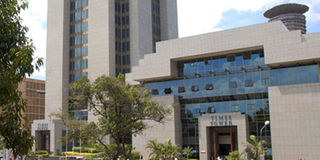Breaking News: At least 10 feared to have drowned in Makueni river
Rogue firms deny Kenya Sh130bn in tax each year, study reveals

The Kenya Revenue Authority headquarters at Times Tower in Nairobi. FILE PHOTO
What you need to know:
- The latest study on illicit flows conducted in Kenya, Tanzania, Uganda, Ghana and Mozambique shows that Tanzania was the country most affected by tax evasion through misinvoicing of goods at $1.81 billion or TSh3 trillion followed by Kenya, then Ghana at $1.44 billion, Uganda at $84 million (Ush 2.2 trillion) and Mozambique at ($585 million).
- The GFI report also said the existence of domestic parallel foreign exchange markets in the country also facilitated illicit flows through trade misinvoicing.
- The lost billions were enough to fund programmes to eradicate extreme poverty and hunger, free primary education and improve child and maternal health in line with the UN Millennium Development Goals.
Kenya loses more than Sh131 billion in tax revenue every year through dubious practices perpetrated by importers and exporters, according to a report released last night.
The report by the US-based international financial watchdog, Global Financial Integrity, said Kenya lost more than Sh1.1 trillion ($13 billion) through trade misinvoicing between 2002 and 2011.
That amount is enough to finance last year’s budget in its entirety, without recourse to donor funds. And the Sh131 billion lost every year is only Sh18.8 billion shy of the Sh149.8 billion that the government is expected to borrow from external lenders, according to this year’s Budget estimates.
Trade misinvoicing refers to the intentional misstating of the value, quantity or composition of goods on customs declaration forms and invoices, usually for the purpose of evading taxes or to facilitate money laundering.
The latest study on illicit flows conducted in Kenya, Tanzania, Uganda, Ghana and Mozambique shows that Tanzania was the country most affected by tax evasion through misinvoicing of goods at $1.81 billion or TSh3 trillion followed by Kenya, then Ghana at $1.44 billion, Uganda at $84 million (Ush 2.2 trillion) and Mozambique at ($585 million).
In Kenya, most of this money is suspected to have been lost through the tourism, tea, coffee, oil, fishing, flower, horticulture and mining besides other general import and export sectors.
Currently, some oil, tea and flower firms are being investigated by the Kenya Revenue Authority over tax evasion through collusion with their overseas partners.
KRA launched a tax evasion audit following allegations that some multi-national companies were employing questionable practices to siphon profits from their Kenyan operations to foreign registered entities, through a practice known as transfer pricing. This is basically moving profits from Kenya which they consider to be a high tax country and declaring it in low tax countries or tax havens.
The KRA Commissioner for Domestic Taxes, Mr Pancrasius Nyaga, said the transfer pricing audits, to be done yearly, are also being expanded to include gas and mining sectors because of the high-risk profile of the export-oriented businesses.
CAPITAL FLIGHT
“We have done audits in the flower and tea sectors. We have concluded one case, about Sher Karuturi. We are ready to start litigation now,” he said recently.
In 2012, KRA had ruled that the Indian firm had used transfer pricing to avoid paying close to $11 million in corporate tax.
The GFI report also said the existence of domestic parallel foreign exchange markets in the country also facilitated illicit flows through trade misinvoicing.
The lost billions were enough to fund programmes to eradicate extreme poverty and hunger, free primary education and improve child and maternal health in line with the UN Millennium Development Goals.
Mr Nyaga said KRA launched tax evasion audits last year after most multi-national firms returned consistent tax losses and sometimes very little taxable profits.
“We had several cases of flower farms that persistently reported losses, hence the launch of audits,” he said.
Kenya Flower Council boss Jane Ngige said the industry was well regulated by the revenue authority and defaulters had been caught.
The new study says under-invoicing of exports averaging $1 billion per year was more than double that of imports ($438 million) between 2002 and 2010.
“Our data for Kenya demonstrates a clear pattern of tax evasion and avoidance through trade misinvoicing, which is enabled at least in part by Kenya’s close connections to the global financial system and by Kenya’s lax regulation and governance of financial activities within the country,” the report said.
Although the issues in question were complex and sensitive, addressing them was necessary for Kenya to curtail illicit capital flight, it recommended.
President Kenyatta recently revealed that Kenya loses Sh10 billion annually to foreigners who fish in its waters. He said that foreign firms licensed to fish in Kenya’s exclusive economic zone either under-value the fish catch or fail to declare it altogether.
The chief executive of the Africa Policy Institute, Prof Peter Kagwanja, said curbing illicit money outflows in Africa was crucial for the continent’s progress.
Some of the illicit money, he said, was generated from criminal activities, corruption, tax evasion and smuggling.
THE NUMBERS
Africa countries lose from malpractices
Tanzania: Lost $1.81 billion
Kenya: Lost $1.51 billion
Ghana: Lost $1.44 billion
Uganda: Lost $884 million
Mozambique: Lost $585 billion




